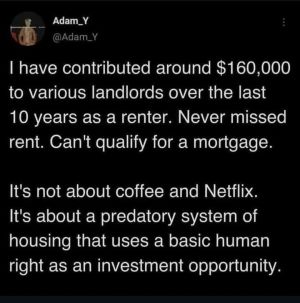Housing Shortages
The Landlord Surplus: A Housing Crisis of Our Own Making
In the United States, we're often told that there's a housing shortage. But let's be real, it's not really a shortage of houses. It's a surplus of landlords.
Landlords, these cunning creatures who seem to multiply faster than rabbits, have realized that housing is a finite resource. And like any good capitalist, they've decided to capitalize on this scarcity. They've driven up rents to astronomical heights, pricing out entire generations of young people and forcing them to live in a box or with roommates.
It's a sad state of affairs. People are working harder than ever, but they can barely afford a roof over their heads. And why? Because a bunch of landlords are sleeping on piles of property, waiting for prices to skyrocket even higher.
It's time to call out these landlords for what they are: profiteers. They're not interested in providing affordable housing; they're interested in maximizing their profits. And they're more than happy to exploit the housing crisis for their own gain.
So, the next time you hear someone complaining about the housing shortage, remember: it's not a shortage of houses. It's a surplus of landlords. And until we can find a way to curb their greed, this crisis will only continue to worsen.
United States
The American Dream, long touted as a beacon of hope, has morphed into a cruel illusion. The housing market, once a symbol of opportunity, has become a tool of exploitation. Renters, the backbone of this system, find themselves trapped in a cycle of endless payments, their hard-earned money fueling the wealth of landlords.
The illusion of upward mobility is shattered as the gap between the haves and have-nots widens. The dream of homeownership, once a cornerstone of the American Dream, is now a distant fantasy for many. Instead, renters are forced to subsidize landlords' wealth, their monthly payments directly contributing to the landlord's financial security.
The only viable solutions seem to be radical: either a collective shift towards a more equitable economic system, such as culling the landlords and resort to communism, or a return to more communal living arrangements, like living with parents or roommates. As the cost of living continues to rise, and the dream of homeownership fades, these once-unthinkable options may become increasingly appealing.
Until then, renters remain trapped in a system that favors the wealthy and powerful. The American Dream, it seems, is reserved for a select few.
Australia
According to the video, Australia's housing market, once a beacon of affordability, is now grappling with a severe crisis. The median house price has doubled in recent years, far outpacing wage growth. This has made homeownership a distant dream for many Australians, particularly younger generations.
Several factors have contributed to this crisis, including government policies, low-interest rates, supply shortages, and immigration.
The consequences of this crisis are far-reaching, including rising rents, homelessness, and social inequality.
To address this crisis, the Australian government has proposed various measures, including increasing housing supply, reforming tax incentives, and supporting first-home buyers.
While these measures may offer some relief, a comprehensive and long-term approach is needed to tackle the root causes of the crisis. As Australia grapples with this challenge, it serves as a cautionary tale for other countries facing similar housing pressures.
